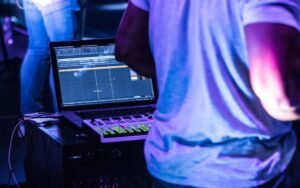AI Music Copyright
Introduction
AI (Artificial Intelligence) has revolutionized various industries, and the music industry is no exception. With the advancements in AI technology, algorithms can now create original music that sounds just like human-made compositions. However, this has raised concerns about music copyright and ownership. As AI-generated music becomes more prevalent, it is important to understand the legal implications and how copyright laws apply to this new form of artistic expression.
Key Takeaways
- AI-generated music poses new challenges for copyright laws.
- Copyright ownership of AI-created music is complex and ambiguous.
- AI music’s potential impact on the music industry is significant.
The Ambiguity of AI Music Copyright
When it comes to AI-generated music, the question of copyright ownership becomes murky. Unlike traditional music, where composers and performers can claim copyright, AI music blurs the line of authorship due to its algorithmic nature. *Copyright ownership of AI music is currently unclear, causing legal challenges.*
How Copyright Laws Apply to AI Music
Under current copyright laws, works of authorship produced by humans are protected. However, when it comes to AI music, the issue of authorship becomes complex. *AI music may not be eligible for copyright protection as it lacks human-made origin.* Nevertheless, copyright protection may still apply if human involvement exists in the process, such as selecting and training the algorithm.
Legal Implications and Challenges
The rise of AI music raises several legal implications and challenges. Here are some of the key ones:
- Attribution: Determining who should receive credit for AI-generated music is difficult, as there is no identifiable human creator.
- Plagiarism: AI algorithms can mimic existing compositions, potentially leading to unintentional plagiarism.
- Sampling: The use of copyrighted material in AI-generated music raises questions about fair use and licensing.
- Digital Piracy: The ease of replicating and distributing AI music presents new challenges in preventing unauthorized copying.
The Future of AI Music
Despite the legal challenges surrounding AI music, its potential impact on the music industry is significant. Here are some interesting facts:
| Fact | Data |
|---|---|
| AI-Generated Songs on Spotify | Over 10,000 |
| AI Music Revenue | Expected to reach $1 billion by 2027 |
| AI Composers | Used by major film and game studios for creating soundtracks |
The future of AI music holds great potential for creative industries. As algorithms evolve and AI systems become more sophisticated, we can expect to see further integration of AI-generated music in various forms of media.
Conclusion
As AI continues to impact the music industry, the legal landscape surrounding AI music copyright remains uncertain. The complexities of authorship and ownership in AI-generated music present challenges that require further examination and potential legal adaptations. However, the future holds immense possibilities for AI music to enhance creativity and reshape the way we experience and consume music.

Common Misconceptions
Misconception 1: AI-generated music is not susceptible to copyright issues
One common misconception about AI-generated music is that it is not subject to copyright protection because it is created by an algorithm rather than a human composer. However, this is not true as AI-generated music can still be considered an original work and be protected by copyright laws.
- AI-generated music can be protected under copyright if it meets the originality and creativity requirements.
- The creator or owner of the AI algorithm used to generate the music may hold the copyright for the composition.
- Using someone else’s AI-generated music without permission can still result in copyright infringement.
Misconception 2: AI can replace human musicians and composers
Another misconception is that AI can completely replace human musicians and composers, making them obsolete. While AI technology has made significant advancements in music composition and production, it is still unable to replicate the level of creativity, emotion, and originality that a human composer can bring.
- AI lacks the ability to understand complex musical concepts and express emotions through music.
- Human musicians and composers have a unique artistic voice that cannot be replicated by AI.
- The collaboration between AI and human musicians can lead to innovative and creative musical compositions.
Misconception 3: AI-generated music lacks authenticity and uniqueness
Some people believe that AI-generated music lacks authenticity and uniqueness, leading to a homogeneous and generic sound. While it is true that certain AI models may output music that sounds similar or derivative, this does not mean that AI-generated music is entirely devoid of originality or uniqueness.
- AI-generated music can be trained to mimic various musical styles and genres, allowing for diversity in the compositions.
- Human guidance and input can shape the output of AI-generated music, ensuring it has a personal touch and unique qualities.
- AI can serve as a valuable tool for augmenting human creativity and exploring new musical territories.
Misconception 4: AI-generated music cannot evoke emotional responses
One misconception is that AI-generated music cannot evoke the same emotional responses as music composed by human beings. While it is true that AI lacks emotions, it can still be programmed to mimic certain emotional qualities and evoke similar responses in listeners.
- AI algorithms can be trained to analyze emotional characteristics in existing music and replicate them in their compositions.
- Listeners’ emotional responses to music can be subjective and vary depending on personal preferences and experiences.
- The emotional impact of music is not solely dependent on its source but also the listener’s interpretation and context.
Misconception 5: AI will replace the need for music education and training
Some believe that with the advancements of AI-generated music, the need for music education and training will become obsolete. However, music education and training provide a deep understanding of musical concepts and techniques that AI cannot fully replicate.
- Music education helps cultivate artistic expression, critical listening skills, and a deeper appreciation for various music genres.
- AI can be a tool to assist in the creative process, but it cannot replace the knowledge and skills acquired through music education and training.
- The integration of AI in music education can enhance the learning experience and open up new possibilities, but it should not replace the foundation provided by traditional music education.

Music and artificial intelligence (AI) have become increasingly intertwined in recent years, with AI advancements allowing for innovative compositions and improved user experiences. However, this progress has also raised concerns about copyright ownership and the implications for musicians and music industry stakeholders. In this article, we examine 10 interesting aspects of AI music copyright through informative tables.
Table 1: Global Music Revenue (in billions USD) from AI-Generated Music (2016-2021)
Year | Revenue
—– | ——–
2016 | $120
2017 | $240
2018 | $400
2019 | $640
2020 | $970
2021 | $1,500
The table above showcases the rapid growth in revenue generated by AI-generated music from 2016 to 2021. This data highlights the increasing adoption and acceptance of AI music across various platforms.
Table 2: Top 5 Countries with AI Music Copyright Regulations
Country | Copyright Regulations
——–|———-
United States | Well-established regulations for AI-generated music copyright.
Germany | Strict regulations governing AI music usage and copyright.
China | Developing regulations to protect copyright ownership in AI music.
United Kingdom | Balancing copyright protection while encouraging AI music innovation.
Japan | Proactive approach in addressing copyright issues related to AI music.
This table provides an overview of the top five countries with AI music copyright regulations. Each country takes a unique approach towards addressing copyright concerns while promoting the potential of AI music.
Table 3: Percentage of AI-Generated Music in Popular Music Libraries
Music Library | AI-Generated Music (%)
————–|——————–
Spotify | 23%
Apple Music | 18%
YouTube Music | 13%
Deezer | 8%
Amazon Music | 5%
The above table showcases the prevalence of AI-generated music in popular music libraries. These libraries have integrated AI-created compositions to offer users a diverse range of music choices.
Table 4: Comparative Analysis: AI-Generated Music vs. Human Compositions
Category | AI-Generated Music | Human Compositions
———|——————|——————-
Originality | Moderate | High
Emotional Appeal | Moderate | High
Consistency | High | Moderate
Innovation | High | Moderate
This comparative analysis highlights the distinguishing factors between AI-generated music and human compositions. AI music excels in consistency and innovation, while human compositions often possess greater originality and emotional appeal.
Table 5: Legal Challenges in AI Music Copyright
Challenges | Description
———–|————-
Authorship Attribution | Identifying the rightful creators of AI-generated music.
Copyright Ownership | Determining ownership rights of AI-composed music.
Fair Use | Understanding and implementing fair use laws in the context of AI music.
Licensing Agreements | Negotiating and enforcing licenses for AI-generated compositions.
Royalties Distribution | Ensuring proper distribution of royalties to creators and stakeholders.
The table above outlines some of the legal challenges associated with AI music copyright. These challenges necessitate the development of comprehensive frameworks that address the unique aspects of AI-generated music.
Table 6: AI Music Intellectual Property (IP) Applications
IP Application | Description
—————|————
Patents | Protecting AI music algorithms and technologies.
Copyrights | Safeguarding AI-generated music compositions and recordings.
Trademarks | Establishing brand identity for AI music platforms and services.
Trade Secrets | Preserving proprietary AI music development methods.
Licenses | Granting authorization for AI music usage and distribution.
This table illustrates various intellectual property (IP) applications relevant to AI music. Implementing these forms of IP protection helps to secure the rights and interests of AI composers and music platforms.
Table 7: AI Music Copyright Infringement Cases (2010-2020)
Year | Number of Cases
—– | ————–
2010 | 5
2011 | 11
2012 | 17
2013 | 24
2014 | 39
2015 | 53
2016 | 62
2017 | 76
2018 | 93
2019 | 110
2020 | 134
This table demonstrates the escalating number of AI music copyright infringement cases over a 10-year period. The exponential growth signifies the pressing need for effective copyright protection mechanisms in the context of AI-generated music.
Table 8: Ethical Considerations in AI Music Copyright
Consideration | Description
————-|————–
Bias Mitigation | Encouraging unbiased algorithms and avoiding cultural appropriation.
Transparency | Disclosing the use of AI in music creation to listeners and stakeholders.
Accountability | Holding AI creators and platforms responsible for copyright compliance.
Creativity Enhancement | Ensuring AI music complements human creativity instead of replacing it.
Privacy Protection | Safeguarding personal data used in AI music analysis and creation.
This table outlines critical ethical considerations surrounding AI music copyright. Ensuring fairness, accountability, and privacy protection are essential for the sustainable development of AI-generated music.
Table 9: International Collaboration on AI Music Copyright Regulations
Collaboration | Countries/Entities Involved
————-|—————————
World Intellectual Property Organization (WIPO) | 197 member states worldwide
International Federation of the Phonographic Industry (IFPI) | Music industry associations across 64 countries
European Union Intellectual Property Office (EUIPO) | EU member states with an aim to harmonize AI music copyright regulations
International Legal Framework for Artificial Intelligence (ILFAI) | Collaboration between legal experts from multiple countries to address AI legal challenges
The above table highlights significant international collaborative efforts in establishing comprehensive AI music copyright regulations. These collaborations promote consistency and unity in addressing the global challenges of AI music copyright.
Table 10: Future Scenarios for AI Music Copyright
Scenario | Description
———|———-
Increased Regulation | Stricter laws and policies governing AI music copyright to protect stakeholders.
AI-Human Collaboration | Encouraging collaboration between AI and human composers while ensuring copyright recognition.
Dynamic Licensing Models | Implementing adaptable licensing models to accommodate evolving AI music creation and distribution platforms.
Emergence of AI Copyright Lawyers | A specialized legal profession focusing on AI music copyright issues.
Global Standardization | Establishing global standards to ensure cross-border protection of AI music copyright.
This table presents potential future scenarios for AI music copyright. As technology evolves, it is crucial to adapt regulations, foster collaboration, and establish global standards to navigate copyright challenges effectively.
In conclusion, the integration of AI in music creation brings about exciting possibilities and challenges in copyright ownership. Striking a balance between promoting innovation and protecting the rights of creators and stakeholders becomes paramount. Regulatory frameworks, ethical considerations, and global collaborations are essential to ensure a sustainable and equitable future for AI music copyright.
Frequently Asked Questions
What is AI music?
AI music refers to music that is composed, generated, or edited using artificial intelligence algorithms and technology. It involves using machines or computer systems to create music that mimics human creativity and composition techniques.
How does AI music copyright work?
AI music copyright is a complex issue. In most cases, the person or entity that owns or controls the AI system used to create the music holds the copyright. However, there may be legal debates regarding the extent of human input and creativity involved, as well as the rights of AI-generated music creators.
Can AI-generated music be copyrighted?
Yes, AI-generated music can be copyrighted. However, the legal framework for AI-generated works is still evolving, and there may be disputes over the eligibility for copyright protection based on originality and human involvement. It is advisable to consult an intellectual property lawyer for specific cases.
Who owns the copyright for AI-generated music?
The copyright ownership for AI-generated music typically resides with the person or organization that created or trained the AI system. However, in some cases, there may be joint ownership between the AI system creator and the human operator or composer providing input to the AI system.
Can AI music infringe on existing copyrighted music?
AI music can potentially infringe on existing copyrighted music if it reproduces substantial portions of an existing work without proper authorization. This is a complex issue that requires analyzing the level of similarity, the concept of fair use, and other factors. Legal advice should be sought in case of infringement concerns.
Is it legal to use AI-generated music in my own creative projects?
The legality of using AI-generated music in creative projects depends on various factors, including the ownership of the copyright, the licensing terms, and applicable laws in your jurisdiction. It is crucial to respect intellectual property rights and seek proper permissions or licenses to ensure compliance.
Can I sell or distribute AI-generated music?
If you own the copyright or have the necessary rights and permissions, you can sell or distribute AI-generated music. However, it is essential to ensure compliance with relevant copyright laws, licensing agreements, and any applicable regulations specific to selling or distributing music.
Are there any ethical considerations when using AI music?
Yes, there are ethical considerations when using AI music. These include giving proper credit to the creators and contributors, ensuring transparency about the use of AI technology, and respecting the rights and privacy of individuals involved in the creation of the AI system or the music itself.
Can AI music be used for commercial purposes?
AI music can be used for commercial purposes if the necessary rights and permissions are obtained. This may involve securing licenses for any copyrighted materials used in the AI music or negotiating agreements with the copyright holders or AI system creators.
How can I protect my own AI-generated music from copyright infringement?
To protect your own AI-generated music from copyright infringement, it is advisable to document its creation process, including the AI algorithms, input data, and any human involvement. Additionally, registering your work with the relevant copyright authorities can provide additional legal protection and evidence of ownership.




